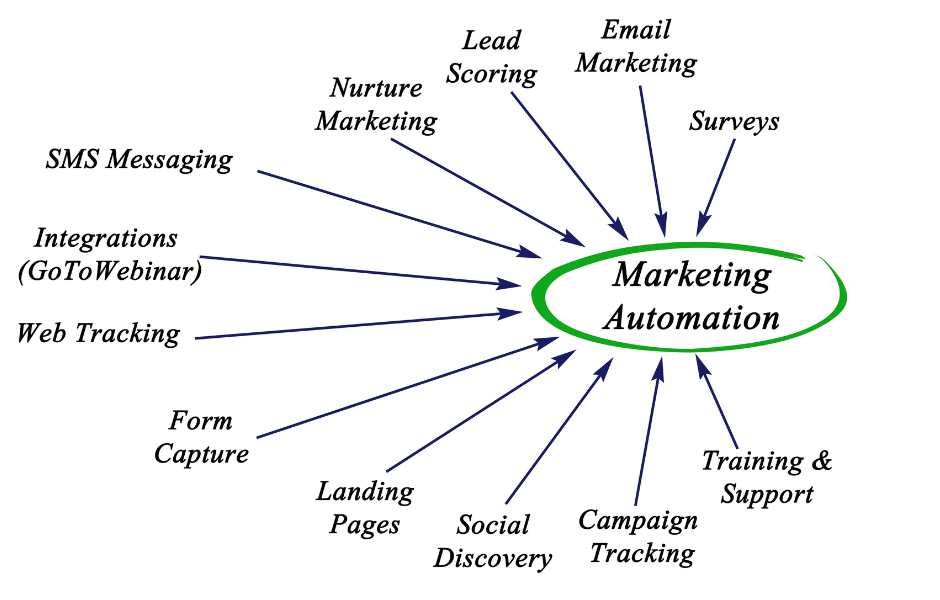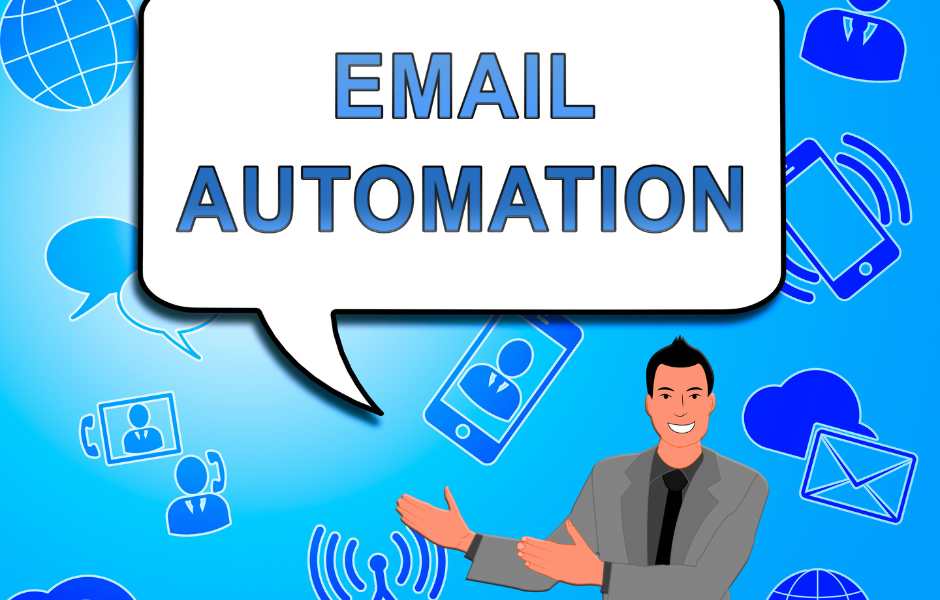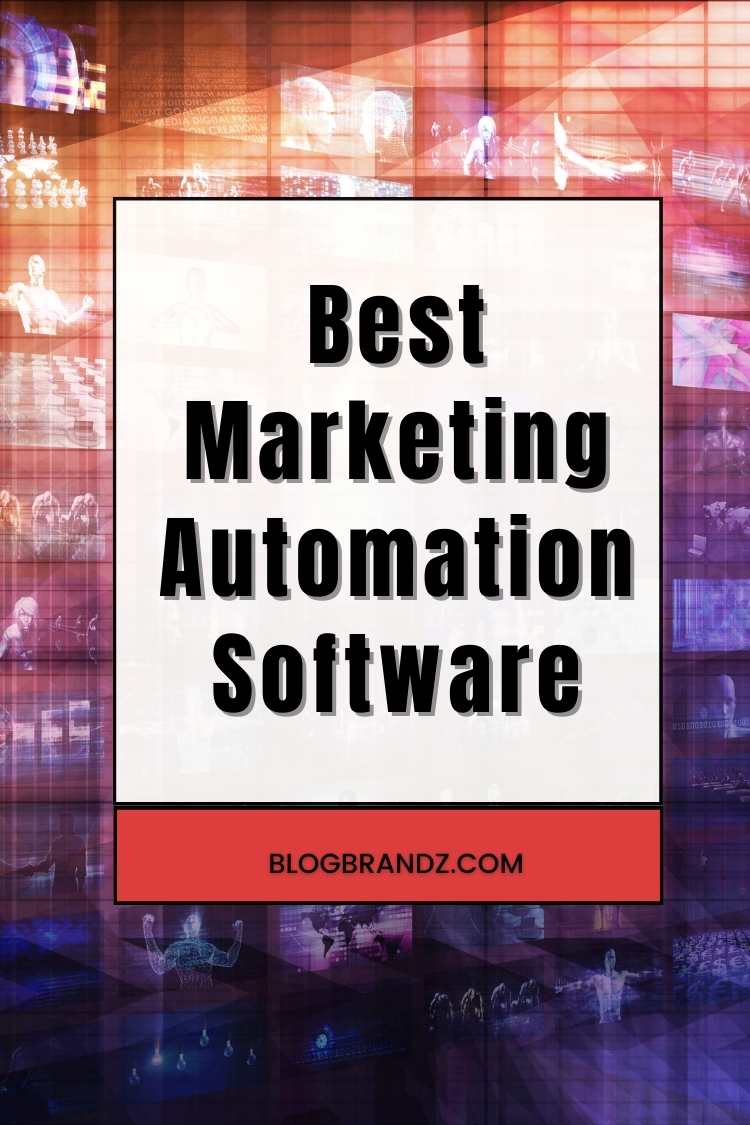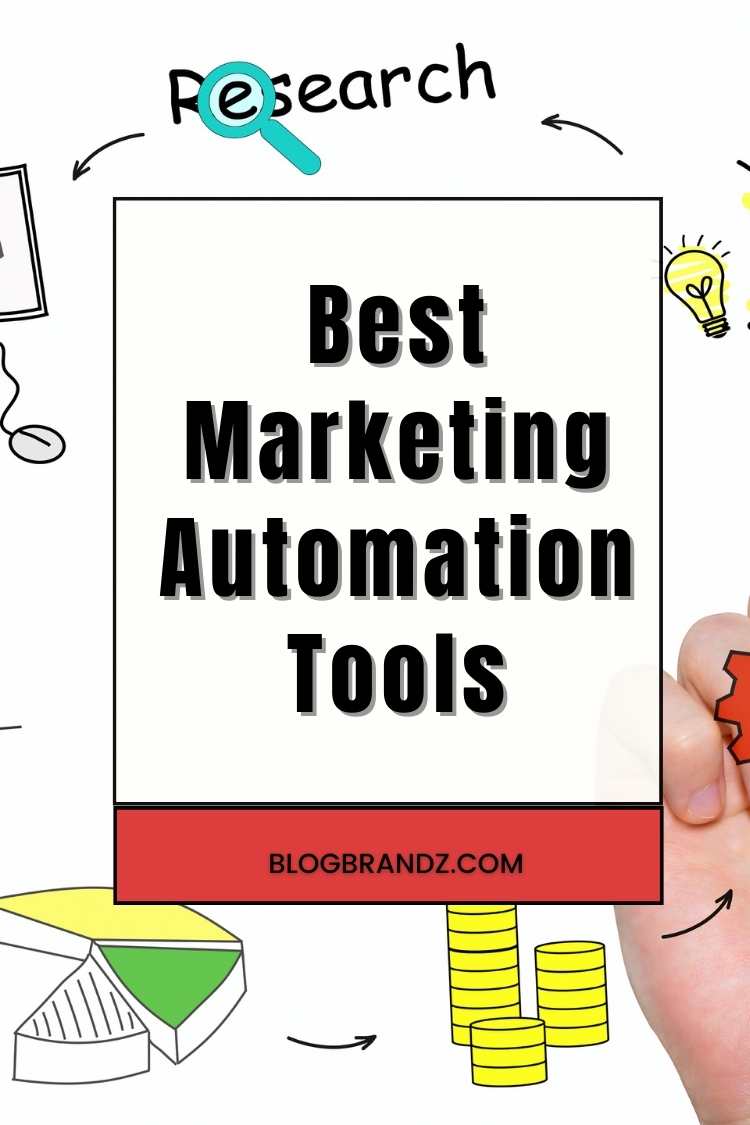Stay ahead of the curve and unlock marketing success with our expert guide to the top marketing automation tools for digital marketers.
In the ever-evolving realm of digital marketing, staying ahead of the curve is paramount. Enter marketing automation tools – the secret weapon of savvy marketers.
Imagine never slogging through tedious email marketing campaigns or social posts again. Marketing automation transforms your marketing into a well-timed symphony, ensuring your audience hears the sweet notes of your message precisely when they’re ready.
But marketing automation isn’t just a tool; it’s a powerhouse for your business. It turbocharges efficiency, supercharges lead generation, and sparks deeper customer engagement.
It nurtures leads like a pro and ensures every decision is backed by data, not guesswork. The result? ROI soars and your marketing campaigns become unstoppable forces of success!
In this article, we embark on a journey through the dynamic landscape of marketing automation, unveiling the best marketing automation tools for digital marketers.
These digital marketing tools empower businesses to streamline campaigns, engage audiences with precision, and extract actionable insights from data.
Whether you’re a marketing maven or a newcomer seeking to elevate your strategies, our guide will illuminate the top-tier tools that can propel your digital marketing efforts to new heights.
Contents
- Benefits of Marketing Automation Tools
- 12 Types of Marketing Automation Platforms
- #1. Email Marketing Automation Tools
- #2. Social Media Automation Tools
- #3. Influencer Marketing Tools
- #4. CRM Automation Tools
- #5. Lead Generation and Nurturing Tools
- #6. Content Marketing Automation Tools
- #7. Analytics and Reporting Tools
- #8. Marketing Analytics and Attribution Tools
- #9. E-commerce Marketing Automation Tools
- #10. Workflow Automation Tools
- #11. Affiliate Marketing Platforms
- #12. LinkedIn Automation Tools
- 17 FAQs About Marketing Automation Tools
- Digital Marketing Tools
Benefits of Marketing Automation Tools
Marketing automation tools are like the magical wizards of your marketing department, and let’s be honest, who doesn’t love a little magic in their business strategy?
These marketing automation platforms are a game-changer for anyone looking to supercharge their marketing efforts, and here’s why they’re so important:
- Time-Saver Extraordinaire: Imagine never having to manually send out those routine emails, or painstakingly schedule social media posts day in and day out. Marketing automation tools do all that grunt work for you, freeing up your precious time to focus on creative brainstorming and strategic thinking.
- Precision Targeting: These tools have a knack for knowing exactly who in your audience is ready to convert. With their ninja-like segmentation abilities, they send the right message to the right people at the right time. No more generic, one-size-fits-all marketing!
- Consistency Matters: Your customers appreciate a consistent brand experience. Marketing automation ensures that every touchpoint, from email to social media, follows your brand guidelines, creating a cohesive and memorable journey.
- Data-Driven Insights: Automation tools aren’t just handy with tasks; they’re also data wizards. They collect and analyze heaps of information about your audience’s behavior. This data helps you make smarter decisions, refine your strategies, and improve your ROI.
- Lead Nurturing Champ: Remember those leads that weren’t quite ready to buy when they first showed up? Automation tools are pros at nurturing those leads, gradually warming them up until they’re ready to make a purchase. It’s like having a personal sales assistant for each lead.
- Personalization Powerhouse: People love feeling special, and automation tools make it easy to send personalized messages that cater to each customer’s interests and behavior. It’s like having a conversation with each of your customers but at scale.
- Multichannel Mastery: Marketing isn’t just about emails anymore. Automation tools manage your presence across various channels – email, social media, SMS, and more. You can meet your audience wherever they prefer to hang out.
- Streamline and Scale: Whether you’re a small startup or an enterprise giant, automation tools adapt to your needs. They help you scale your efforts efficiently and keep things organized as you grow.
- ROI Rocket Booster: At the end of the day, it’s all about that Return on Investment (ROI). Marketing automation ensures your marketing efforts are efficient and effective, and ultimately contribute to your bottom line.
Marketing automation tools aren’t just a nice-to-have; they’re a must-have for any business looking to thrive in today’s digital landscape. They’re like having a team of marketing superheroes working tirelessly behind the scenes, making sure your brand shines brighter than ever.
12 Types of Marketing Automation Platforms
The marketing automation galaxy is vast, offering tools for every facet of your strategy. Dive into the lead generation process with email marketing automation for personalized communication.
Harness the power of social media marketing tools for effortless posting and engagement. Unlock the potential of CRM automation for seamless customer relationships.
And don’t forget digital marketing analytics platforms, your data-driven compass in this digital wilderness. With this arsenal, you’re equipped to conquer the marketing universe!
Here are some popular types of marketing automation tools categorized by their purposes:
#1. Email Marketing Automation Tools
- Convertkit: Email marketing provider that has some extremely powerful features and the best email deliverability.
- Sendmails: Pay once and use forever all-in-one AI-powered platform that lets you send emails, manage contacts, capture leads, and automate your marketing.
- Flodesk: Budget-friendly email marketing solution that offers unlimited subscribers and access to all features for $38/mo.
- Podia: All-in-one marketing platform that offers a website, email management, sales pages, community building, and more.
#2. Social Media Automation Tools
- Simplified: All-in-one AI-powered platform to design, scale, and publish images, videos, and more directly to social media.
- Tailwind App: A complete Pinterest and Instagram marketing toolkit for bloggers and small businesses.
- SocialPilot: A simple and cost-effective social media management tool for teams and agencies.
- Meta Business Suite: Manage your marketing content on Facebook and Instagram, share stories and ads, and schedule content to plan ahead.
#3. Influencer Marketing Tools
- Ninja Outreach: Find and manage social media influencers in any niche and location with their built-in CRM.
- Intellifluence: SEO-friendly influencer marketing platform for blog posts, links, social media shares, and more.
- SmartWriter: Automate your cold email outreach with personalized cold emails to build 1-on-1 relationships with prospective influencers and bloggers at scale.
#4. CRM Automation Tools
- HubSpot CRM: Take control of your marketing, sales, customer service, content management, and operations with Hubspot marketing automation tools.
- Zoho CRM: Zoho marketing automation tools provide CRM automation, lead management, and analytics.
- Salesforce: Offers comprehensive CRM automation with sales and marketing features.
#5. Lead Generation and Nurturing Tools
- ActiveCampaign: Combines email marketing, CRM, and automation for lead nurturing.
- Adobe Marketo: Offers lead scoring, nurturing, and campaign automation.
- Oracle Eloqua: Provides B2B lead generation and marketing automation.
#6. Content Marketing Automation Tools
- Content at Scale: Write human-like AI content with a content automation platform built to scale content marketing.
- Surfer SEO: Content intelligence tool that merges content strategy, creation, and optimization.
- MarketMuse: Automates content audits and creates content plans in minutes with page-level, site-level, and SERP insights.
- SEMrush: Provides SEO and content marketing automation features, including competitive analysis.
#7. Analytics and Reporting Tools
- Google Analytics: Offers website and traffic analytics.
- Google Looker Studio: Allows creating custom reports and dashboards.
- Moz Pro: Provides SEO analytics and insights.
#8. Marketing Analytics and Attribution Tools
- Adobe Analytics: Offers advanced analytics and attribution modeling.
- Adobe Marketo Measure (formerly Bizible): Focuses on marketing attribution and revenue attribution.
#9. E-commerce Marketing Automation Tools
- Shopify: Offers e-commerce automation features for online stores.
- Klaviyo: Specializes in e-commerce email marketing and automation.
- Adobe Commerce (formerly Magento): Provides automation capabilities for e-commerce businesses.
#10. Workflow Automation Tools
- Zapier: Connects various apps and automates workflows between them.
- Make (formerly Integromat): Similar to Zapier, it automates workflows and integrations.
- Microsoft Power Automate: Automates processes across Microsoft 365 apps and other services.
#11. Affiliate Marketing Platforms
- Impact’s Partnership Cloud: Provides affiliate marketing and performance marketing solutions to help brands increase revenue and ROAS.
- ShareASale: A popular affiliate marketing network with a vast selection of merchants and products to promote.
- Amazon Associates: Amazon’s affiliate program, where affiliates can promote and earn commissions on a wide range of Amazon products.
#12. LinkedIn Automation Tools
- useArtemis: It lets you easily find and import prospects from LinkedIn or Sales Navigator, centralize conversations, add tags, set filters, and leverage AI-powered replies.
- Dux-Soup: Find fresh, qualified LinkedIn leads so you can grow your sales pipeline and focus on closing deals faster to accelerate business growth.
These are just some examples of marketing automation tools based on their specific purposes. The choice of tools depends on your business goals, needs, and the specific marketing tasks you want to automate.
17 FAQs About Marketing Automation Tools
People often have various questions about marketing automation tools as they consider implementing them for their businesses. Here are some common questions people ask about marketing automation tools:
- How do marketing automation tools help with lead generation and nurturing?
Marketing automation tools assist in lead generation by capturing, scoring, and segmenting leads. They nurture leads through automated email workflows, delivering relevant content to move prospects closer to conversion.
- What are some examples of marketing tasks that can be automated?
Marketing automation can automate tasks like email marketing, lead scoring, social media posting, and customer segmentation, saving time and ensuring consistency in marketing efforts.
- How do I choose the right marketing automation tool for my business?
To choose the right marketing automation tool, consider your business goals, budget, scalability, ease of use, and the specific features you require, such as email automation or lead scoring.
- What features should I look for in a marketing automation platform?
Features to look for in a marketing automation platform include email marketing capabilities, lead management tools, automation workflows, reporting and analytics, CRM integration, and scalability.
- How much does marketing automation software typically cost?
Marketing automation software costs can vary widely, from free or low-cost options to enterprise-level solutions. Pricing depends on the provider and the features included.
- Are there any ongoing costs or hidden fees associated with marketing automation?
The ongoing costs may include subscription fees, costs associated with scaling up, and potential additional integrations or support expenses.
- How long does it take to set up and implement a marketing automation system?
Setting up marketing automation can take several weeks to a few months, depending on the complexity of your workflows and integrations.
- Do I need a dedicated marketing team to use marketing automation effectively?
While a dedicated marketing team can enhance the effectiveness of marketing automation, many tools are user-friendly and can be managed by small teams or individuals.
- Can marketing automation tools integrate with other software and platforms?
Most marketing automation tools offer integration options with other software, including CRMs, email platforms, and analytics tools, to create a seamless marketing ecosystem.
- What types of businesses or industries benefit most from marketing automation?
Various industries and businesses, including B2B and B2C, benefit from marketing automation, particularly those with a focus on lead generation and customer engagement.
- How can marketing automation improve my email marketing efforts?
Marketing automation improves email marketing by sending personalized, timely emails, automating follow-ups, and segmenting email lists for better targeting.
- What metrics and analytics can I track with marketing automation?
With marketing automation, you can track metrics like open rates, click-through rates, conversion rates, and ROI. This data helps refine marketing strategies.
- Are there any best practices for using marketing automation effectively?
Best practices for using marketing automation include segmenting your audience, creating relevant content, setting clear goals, testing campaigns, and regularly analyzing results for optimization.
- What are some common challenges or pitfalls when using marketing automation?
Challenges in marketing automation may include data quality issues, over-automation, lack of personalization, and ensuring compliance with data privacy regulations.
- Can marketing automation tools help with social media marketing and advertising?
Yes, marketing automation tools can help with scheduling and managing social media posts, analyzing social engagement, and even running paid social advertising campaigns.
- How do I measure the ROI of my marketing automation investment?
Measuring ROI involves tracking metrics like customer acquisition costs, conversion rates, and revenue generated from automated campaigns compared to the cost of the tool and its implementation.
- Are there any compliance and data privacy considerations when using marketing automation?
Compliance and data privacy considerations involve obtaining consent for data collection and ensuring compliance with regulations like GDPR or CCPA when using customer data in automated marketing campaigns.
Consider these questions as your compass on the exciting journey of integrating marketing automation tools into your business strategy. Yet remember, the answers are like keys, unique to your business’s needs and the tools you choose.
So, dive into research, explore your options, and evaluate with care. Marketing automation holds boundless opportunities; your quest is to find the perfect fit for your business’s success story.
Digital Marketing Tools
- Best AI Content Generator Tools For Writing AI Content
- Best Online Paraphrasing Tools to Rewrite Sentences Online
- How To Use AI SEO & Machine Learning In SEO Automation
- Best SEO Content Writing Tools To Write SEO-Friendly Articles
- How To Do Email Marketing Without Breaking the Bank
- 50 Best SEO Blog Writing & Blogging Tools To Boost Traffic
© 2023 – 2024, Priya Florence Shah. All rights reserved.
Priya Florence Shah is a bestselling author and an award-winning blogger. Check out Devi2Diva, her book on emotional self-care for women. In her spare time, Priya writes science-fiction novels and poetry and chills with her two-legged and four-legged kids.
Discover more from Business & Branding Tips
Subscribe to get the latest posts sent to your email.















